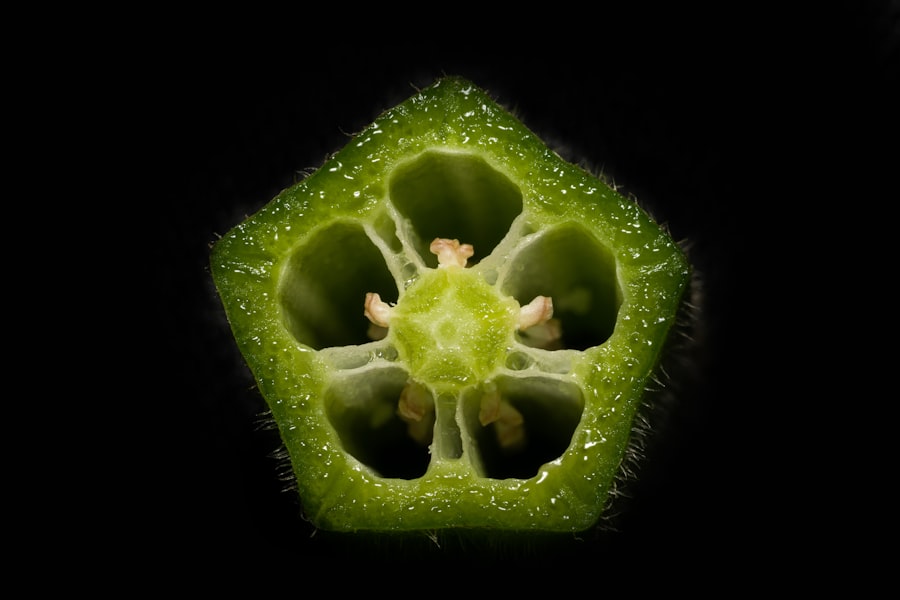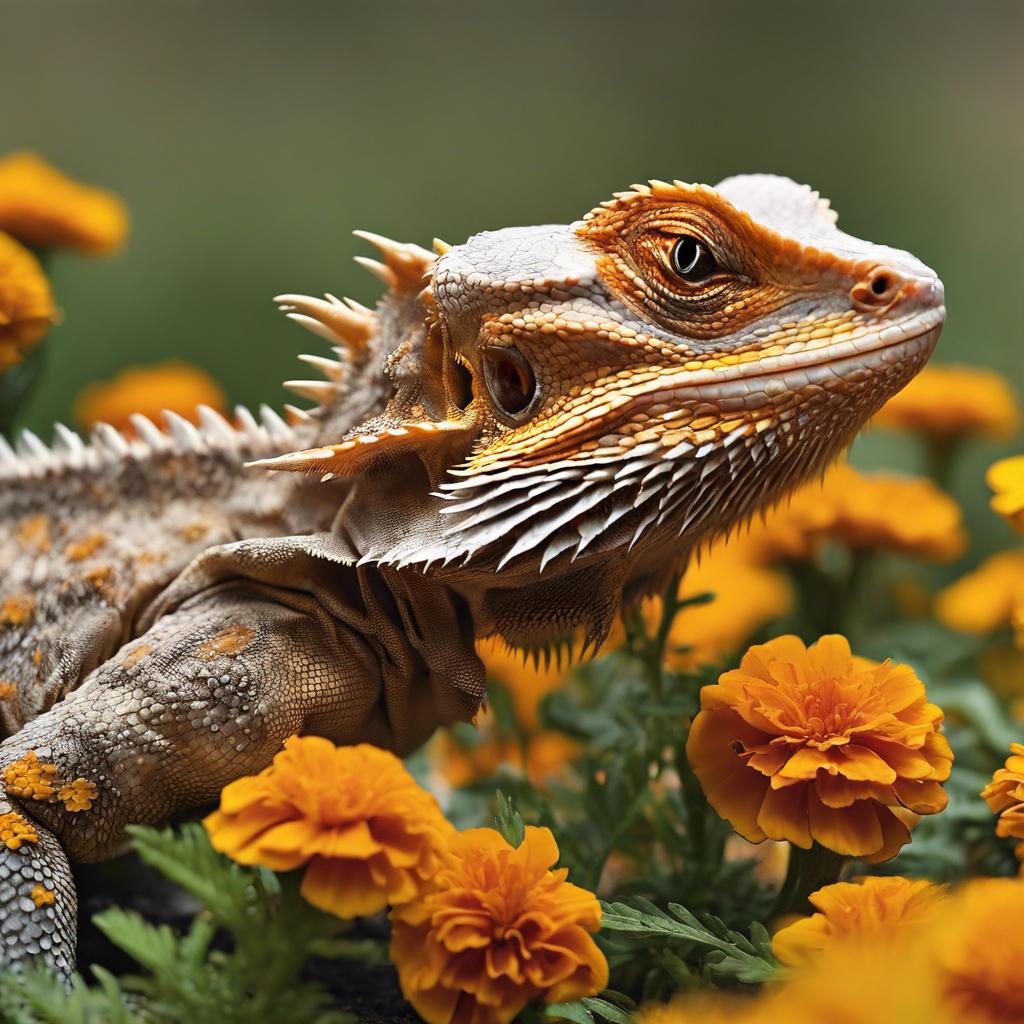Bearded dragons are popular reptile pets known for their unique appearance and docile nature. Native to Australia, these lizards have become increasingly popular as pets due to their low maintenance requirements and friendly demeanor. However, like all pets, bearded dragons require proper care and nutrition to thrive.
One of the most important aspects of caring for a bearded dragon is providing them with a balanced and nutritious diet. A well-rounded diet is crucial for their overall health and longevity. In the wild, bearded dragons are omnivorous, meaning they eat a combination of insects, vegetables, and fruits. As captive pets, it is important to replicate their natural diet as closely as possible.
Key Takeaways
- Bearded dragons are popular pets that require a balanced diet of insects, vegetables, and fruits.
- Marigolds can be fed to bearded dragons in moderation, but should not be a staple food.
- Marigolds are high in carotenoids, which can improve the coloration of a bearded dragon's skin.
- Feeding too many marigolds can lead to digestive issues and should be avoided.
- Other safe and nutritious foods for bearded dragons include collard greens, dandelion greens, and butternut squash.
Bearded Dragon Diet
In the wild, bearded dragons primarily eat insects such as crickets, mealworms, and roaches. They also consume a variety of vegetation including leafy greens, flowers, and fruits. It is important to mimic this diet in captivity to ensure that they receive all the necessary nutrients.
A recommended diet for captive bearded dragons consists of 70% vegetables and 30% insects. Leafy greens such as collard greens, mustard greens, and dandelion greens should make up the majority of their vegetable intake. Other vegetables such as bell peppers, squash, and carrots can also be included in their diet.
When it comes to insects, it is important to provide a variety to ensure they receive a balanced diet. Crickets, mealworms, roaches, and silkworms are all suitable options. It is important to gut-load the insects before feeding them to the bearded dragon. This involves feeding the insects a nutritious diet for at least 24 hours before offering them to the lizard.
Can Bearded Dragons Eat Marigolds?
One common question that arises when it comes to bearded dragon diets is whether or not they can eat marigolds. Marigolds are a type of flower that are often found in gardens and are known for their vibrant colors. While bearded dragons can consume a variety of flowers, it is important to exercise caution when introducing new foods into their diet.
Nutritional Value of Marigolds for Bearded Dragons
Marigolds contain a variety of vitamins and minerals that can be beneficial for bearded dragons. They are rich in vitamin A, which is important for maintaining healthy skin and eyesight. Marigolds also contain vitamin C, which is an antioxidant that helps boost the immune system. Additionally, they provide small amounts of calcium, potassium, and magnesium.
These nutrients can contribute to the overall health and well-being of bearded dragons. Vitamin A is essential for proper growth and development, while vitamin C helps support their immune system. Calcium is crucial for bone health, and potassium and magnesium play important roles in various bodily functions.
Risks and Benefits of Feeding Marigolds to Bearded Dragons
While marigolds do offer some nutritional benefits, there are also potential risks associated with feeding them to bearded dragons. One of the main concerns is the potential for pesticides or other chemicals that may have been used on the flowers. It is important to ensure that any flowers or plants offered to bearded dragons are free from harmful substances.
Another risk is the potential for digestive upset or allergic reactions. Some bearded dragons may have sensitivities or allergies to certain plants or flowers, including marigolds. It is important to monitor their behavior and digestion after introducing any new food into their diet.
Despite these risks, there are also potential benefits to feeding marigolds to bearded dragons. The vitamins and minerals found in marigolds can contribute to their overall health and well-being. Additionally, introducing a variety of foods into their diet can help prevent boredom and encourage them to eat a well-rounded diet.
How to Prepare Marigolds for Bearded Dragons

If you decide to feed marigolds to your bearded dragon, it is important to properly prepare them to ensure they are safe and free from any potential contaminants. Here is a step-by-step guide on how to prepare marigolds for bearded dragons:
1. Choose organic marigolds: Look for organic marigolds that have not been treated with pesticides or other chemicals. This will help ensure that the flowers are safe for your bearded dragon to consume.
2. Wash the flowers: Thoroughly wash the marigold flowers under running water to remove any dirt or debris. This will help remove any potential contaminants that may be present on the flowers.
3. Remove the petals: Gently remove the petals from the marigold flowers. Be sure to discard any stems or other parts of the flower that may be difficult for your bearded dragon to digest.
4. Offer in moderation: Introduce the marigold petals into your bearded dragon's diet gradually and in small amounts. Monitor their behavior and digestion to ensure they tolerate the new food well.
Alternatives to Marigolds for Bearded Dragons
If you are unsure about feeding marigolds to your bearded dragon or if you are unable to find organic flowers, there are plenty of other safe and nutritious foods that can be offered instead. Some alternatives include dandelion greens, hibiscus flowers, rose petals, and squash blossoms.
It is important to provide a variety of foods in their diet to ensure they receive all the necessary nutrients. This can help prevent boredom and encourage them to eat a well-rounded diet. Consulting with a veterinarian who specializes in reptiles can also provide guidance on suitable foods for your bearded dragon.
Bearded Dragon Care Tips
In addition to providing a proper diet, there are several other factors to consider when caring for a bearded dragon. Here are some general care tips to keep in mind:
1. Lighting and temperature: Bearded dragons require specific lighting and temperature conditions to thrive. They need access to both UVA and UVB light to help them metabolize calcium and maintain proper bone health. A basking spot with a temperature of around 95-100°F (35-38°C) should also be provided.
2. Habitat: Bearded dragons require a spacious enclosure with proper substrate, hiding spots, and climbing opportunities. The enclosure should be kept clean and well-maintained to prevent the growth of bacteria or parasites.
3. Hydration: Bearded dragons require access to fresh water at all times. It is important to provide a shallow dish of water that is easily accessible for them to drink from.
4. Handling: Bearded dragons are generally docile and can be handled, but it is important to approach them gently and avoid any sudden movements. Regular handling can help socialize them and build trust.
Common Health Issues in Bearded Dragons
While bearded dragons are generally hardy pets, they can still experience health issues. Some common health issues that bearded dragons may face include metabolic bone disease, respiratory infections, parasites, and impaction.
Metabolic bone disease is a condition that occurs when bearded dragons do not receive enough calcium or vitamin D3 in their diet. This can lead to weak bones, deformities, and other health problems. Respiratory infections can occur if the bearded dragon's enclosure is not kept clean or if they are exposed to cold temperatures.
Parasites such as mites or worms can also affect bearded dragons, especially if they are fed insects that are not properly gut-loaded or if their enclosure is not kept clean. Impaction occurs when a bearded dragon ingests something that they cannot digest, such as substrate or large pieces of food.
Preventing these health issues involves providing a proper diet, maintaining a clean enclosure, and monitoring their behavior and digestion. If you notice any signs of illness or abnormal behavior, it is important to consult with a veterinarian who specializes in reptiles.
Feeding Marigolds to Bearded Dragons Safely and Responsibly
In conclusion, marigolds can be safely fed to bearded dragons as part of a well-rounded diet. They offer a variety of vitamins and minerals that can contribute to their overall health and well-being. However, it is important to exercise caution when introducing new foods into their diet and to ensure that the flowers are free from pesticides or other chemicals.
Feeding marigolds to bearded dragons should be done in moderation and as part of a varied diet. It is important to provide a balanced combination of vegetables and insects to ensure they receive all the necessary nutrients. Consulting with a veterinarian who specializes in reptiles can provide guidance on suitable foods and help address any concerns about your bearded dragon's diet.
By following proper care guidelines and providing a nutritious diet, you can ensure that your bearded dragon remains healthy and happy for years to come.
If you're wondering whether bearded dragons can eat marigolds, you might also be interested in learning about what other plants are safe for them to consume. Reptile Wizard has an informative article on their website that discusses the safety of various plants for bearded dragons, including marigolds. To find out more, check out their article on “Are Pothos Safe for Bearded Dragons?” This article provides valuable insights into the dietary options for your beloved reptile friend.
FAQs
What are marigolds?
Marigolds are flowering plants that belong to the sunflower family. They are commonly grown in gardens for their bright and colorful blooms.
Can bearded dragons eat marigolds?
Yes, bearded dragons can eat marigolds. However, they should only be given as an occasional treat and not as a regular part of their diet.
Are marigolds nutritious for bearded dragons?
Marigolds are not particularly nutritious for bearded dragons. They are low in protein and other essential nutrients that bearded dragons need to thrive.
What are the benefits of feeding marigolds to bearded dragons?
Feeding marigolds to bearded dragons can provide some variety in their diet and may help stimulate their appetite. However, there are no significant health benefits to feeding marigolds to bearded dragons.
Are there any risks to feeding marigolds to bearded dragons?
Marigolds are generally safe for bearded dragons to eat in small amounts. However, they should not be given in large quantities as they can cause digestive upset and diarrhea. Additionally, bearded dragons should not be fed marigolds that have been treated with pesticides or other chemicals.

